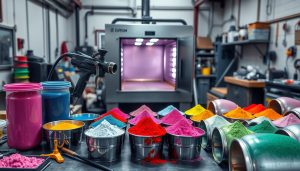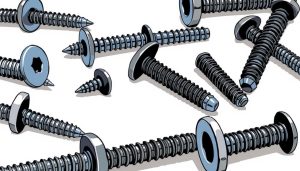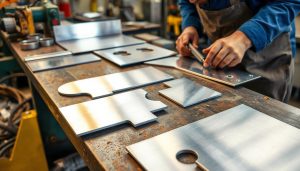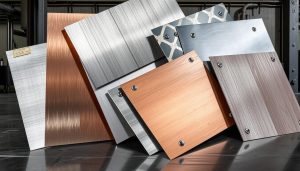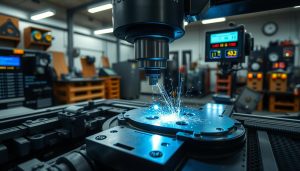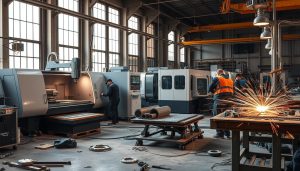In the dynamic world of manufacturing, sheet metal fabrication has emerged as a versatile and indispensable process, enabling the creation of a wide range of products across diverse industries. From the sleek exteriors of automobiles to the intricate components that power our electronics and HVAC systems, the art of sheet metal fabrication is a critical cornerstone of modern industrial design and production.
This comprehensive guide delves into the intricacies of sheet metal fabrication, providing valuable insights into the manufacturing process, key techniques, and the materials used to bring these intricate designs to life. Whether you’re a seasoned manufacturer or an aspiring industry professional, this guide will equip you with the knowledge to navigate the complexities of sheet metal fabrication and make informed decisions that drive innovation and efficiency.
What is Sheet Metal Fabrication?
Sheet metal fabrication is a manufacturing process that transforms flat metal sheets into intricate and customized components. This versatile technique involves a series of steps, from cutting and bending to welding and finishing, to create a wide range of metal products. By leveraging various metal forming techniques, fabricators can shape steel, aluminum, copper, and other alloys into precise, functional, and visually appealing forms.
The Process of Sheet Metal Fabrication
The sheet metal fabrication process typically begins with the selection of the appropriate metal material based on the project’s requirements. The metal sheets are then measured, marked, and cut using specialized tools and equipment, such as shears, lasers, or CNC machines. Next, the cut pieces undergo bending operations, where they are shaped into the desired three-dimensional forms using press brakes or other bending tools.
Finally, the fabricated components are assembled through welding techniques, ensuring a sturdy and cohesive final product. Depending on the application, additional finishing steps, such as polishing, painting, or powder coating, may be applied to enhance the appearance and durability of the fabricated metal parts.
Materials Used in Sheet Metal Fabrication
The most common materials used in sheet metal fabrication are steel, aluminum, and copper. Each material offers unique properties and characteristics that make it suitable for different applications. Steel is known for its strength and versatility, aluminum is lightweight and corrosion-resistant, while copper provides excellent electrical and thermal conductivity. Fabricators carefully select the appropriate material based on the project’s performance requirements, cost considerations, and aesthetic preferences.
| Material | Strength | Corrosion Resistance | Conductivity | Typical Applications |
|---|---|---|---|---|
| Steel | High | Moderate | Moderate | Automotive parts, machinery, construction |
| Aluminum | Moderate | High | High | Electronics, HVAC systems, transportation |
| Copper | High | High | Excellent | Electrical components, plumbing, roofing |
Factors Affecting Sheet Metal Fabrication Costs
When it comes to sheet metal fabrication, the costs can vary significantly depending on several key factors. Understanding these factors is crucial for businesses looking to accurately budget and plan their projects. Let’s explore the primary elements that influence the pricing of sheet metal fabrication.
Material Selection and Its Impact on Pricing
The choice of material is one of the most significant factors that can impact the overall fabrication costs. Factors such as the type of metal, thickness, and availability can all contribute to the final price. For example, stainless steel is generally more expensive than mild steel, while aluminum may offer a more cost-effective solution for certain applications.
Labor and Machine Time Considerations
The labor costs and the time required to operate the necessary machines play a crucial role in determining the fabrication costs. Complex projects that involve intricate designs or require specialized techniques may take more time and effort, leading to higher labor and machine time expenses.
Design Complexity and Customization
The design complexity and the level of customization required for a project can also significantly affect the fabrication costs. Unique or complex designs that require additional tooling, specialized equipment, or multiple fabrication steps will generally be more expensive than standard, off-the-shelf solutions.
By understanding these key factors, businesses can make informed decisions about their sheet metal fabrication projects and ensure they are getting the best value for their investment.

“The key to successful sheet metal fabrication is understanding the factors that drive the costs. By carefully considering material selection, labor requirements, and design complexity, businesses can optimize their budgets and get the most out of their fabrication projects.”
Benefits of Sheet Metal Fabrication for Manufacturing
Sheet metal fabrication has emerged as a game-changer in the manufacturing industry, offering a wealth of advantages that streamline production processes and deliver superior results. From precision manufacturing to enhanced customization options, this versatile technology is revolutionizing the way businesses approach component creation and assembly.
High Precision and Customization Options
One of the primary benefits of sheet metal fabrication is its ability to achieve high precision in component manufacturing. Advanced computer-controlled machinery and cutting-edge techniques ensure that each part is crafted with exceptional accuracy, meeting the most demanding specifications. This precision translates to customization capabilities that allow manufacturers to tailor their products to the unique needs of their clients, delivering unique solutions that stand out in the market.
Durability and Versatility of Fabricated Parts
The materials used in sheet metal fabrication, such as steel and aluminum, inherently possess remarkable durability and strength. This ensures that the parts produced through this process are built to withstand the rigors of heavy-duty applications, making them ideal for a wide range of industries, from automotive to architecture. The versatility of sheet metal fabrication further enhances its value, allowing manufacturers to create a diverse array of components that cater to various market demands.
Speed and Efficiency in Production
In addition to precision and durability, sheet metal fabrication also offers unparalleled efficiency in the production process. Automated machinery and streamlined workflows enable manufacturers to achieve rapid turnaround times, reducing lead times and improving overall production speed. This efficiency translates to cost savings and increased competitiveness in the market, making sheet metal fabrication an invaluable asset for modern manufacturing operations.
“Sheet metal fabrication has revolutionized the way we approach manufacturing, unlocking new levels of precision, customization, and efficiency that were once unimaginable.”
Common Applications of Sheet Metal Fabrication
Sheet metal fabrication is a versatile manufacturing process that finds applications across diverse industries. From the automotive sector to electronics and HVAC systems, and even architectural and construction projects, this technology plays a crucial role in shaping the world around us.
Automotive Industry
In the automotive industry, sheet metal fabrication is essential for producing a wide range of vehicle components. From intricate body panels and chassis parts to engine enclosures and exhaust systems, the strength, precision, and customization capabilities of fabricated metal parts are invaluable. Automotive fabrication allows for the creation of lightweight, durable, and visually appealing designs that meet the demanding standards of the automotive market.
Electronics and HVAC Systems
Electronics manufacturing and HVAC (Heating, Ventilation, and Air Conditioning) systems also heavily rely on sheet metal fabrication. Enclosures, housings, and ductwork for electronic devices and HVAC equipment are often fabricated from metal, ensuring protection, rigidity, and efficient airflow. The versatility of sheet metal allows for the creation of complex shapes and intricate designs, making it a preferred choice for these industries.
Architecture and Construction
In the realm of architecture and construction, sheet metal fabrication plays a crucial role in creating structural and decorative elements. From architectural metalwork like facade cladding, roofing, and decorative features to construction materials like ductwork and HVAC components, fabricated metal parts contribute to the durability, functionality, and aesthetic appeal of buildings and infrastructure.

The wide-ranging applications of sheet metal fabrication highlight its importance in shaping modern industries and infrastructure. By leveraging the inherent strengths of fabricated metal parts, manufacturers and designers can create innovative, high-quality products that meet the demands of their respective markets.
How to Choose the Right Sheet Metal Fabrication Service
Selecting the right sheet metal fabrication service is crucial for the success of your project. When evaluating potential partners, it’s important to consider several key factors, including quality standards, cost-effectiveness, and customer support.
Quality Standards and Certifications to Look For
Ensure the fabrication service you choose adheres to the highest quality standards and holds relevant industry certifications. Look for certifications such as ISO 9001, ASME, or NBBI, which demonstrate a commitment to consistent, high-quality workmanship. These certifications can provide peace of mind and assurance that your fabricated parts will meet or exceed your expectations.
Cost-Effectiveness vs. Quality
While cost is an important consideration, it should not be the sole factor in your decision-making process. Prioritize finding a cost-effective manufacturing partner that can deliver the quality and precision your project demands. Carefully evaluate the balance between pricing and the level of craftsmanship, as this can have a significant impact on the long-term performance and durability of your fabricated components.
Delivery Timelines and Customer Support
- Consider the fabrication service’s ability to meet your project’s timeline requirements. Inquire about their lead times and their track record of on-time deliveries.
- Evaluate the level of customer support provided by the fabrication service. Responsive and attentive communication can make a difference in the success of your collaboration.
By carefully evaluating these factors, you can ensure that you select the fabrication service that best aligns with your quality standards and cost-effective manufacturing needs, while providing the support and responsiveness you require for a successful project.
Why Choose Shixinproto for Your Sheet Metal Fabrication Needs?
When it comes to sheet metal fabrication, Shixinproto stands out as a trusted partner for businesses across various industries. With a commitment to excellence and a focus on high-precision manufacturing, Shixinproto offers customized solutions tailored to meet the unique requirements of each project.
Expert Fabrication Services with High Precision
At Shixinproto, our team of skilled fabricators and engineers leverages state-of-the-art equipment and cutting-edge technologies to deliver precision-engineered metal components. From intricate laser cutting to seamless welding, our fabrication processes ensure consistently accurate and reliable results, making us the go-to choice for businesses seeking the highest quality standards.
Customized Solutions Tailored to Your Project
At Shixinproto, we understand that every project is unique, which is why we take a collaborative approach to understand your specific needs. Our experts work closely with you to design and fabricate customized metal solutions that perfectly align with your project requirements, whether it’s for the automotive, electronics, HVAC, or construction industry. With Shixinproto, you can rest assured that your sheet metal fabrication needs will be met with the utmost precision and attention to detail.
